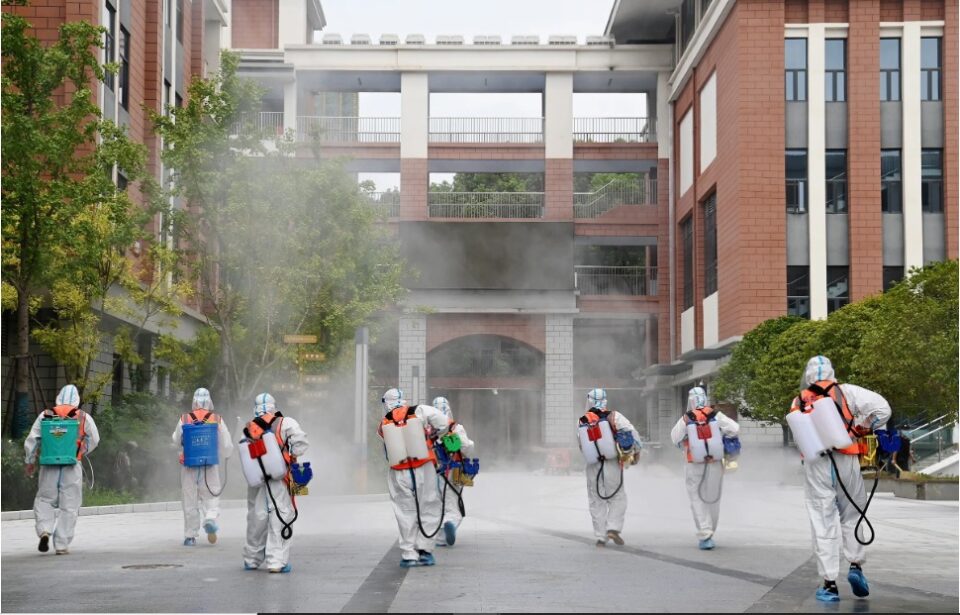The debate over the origins of the coronavirus has largely been conducted in the West, despite the fact that the pathogen originated in the Chinese city of Wuhan.
Chinese authorities have officially maintained a vague stance, meant largely to deflect criticism. Meanwhile, scientists who may hold clues to how the pandemic began — likely sometime in late 2019 — appear to have been silenced.
That changed ever so slightly this week, when George Gao, the former head of the Chinese Center for Disease Control and Prevention, offered his thoughts on the contentious question to a BBC podcast.
What did Gao say?
“Don’t rule out anything.”
It may not seem like much, but Gao was clearly acknowledging that the coronavirus could have emerged as a result of a laboratory accident at the Wuhan Institute of Virology.
The remarks came in a new BBC podcast, “Fever: The Hunt for Covid’s Origin.”
Initially, most scientists thought the virus originated at a wildlife market in Wuhan. But gradually, opinion has shifted toward the likelihood of human error.
China has strenuously denied that such a “leak” took place, and Gao did not present any evidence to counter those denials. But he also did not make such a denial himself when presented with the chance to do so.
Lab leak proponent and former National Security Council official Jamie Metzl told Yahoo News that he could not recall another Chinese scientist making a similar concession.
“At least on the surface, he has been pretty honest and straightforward from the beginning,” Metzl said of Gao. “My personal sense is that he is trying to maintain scientific credibility while not overly upsetting the Chinese government.”
In fact, Gao may have even been encouraged by Beijing, speculates Richard Ebright, a Rutgers molecular biologist and an outspoken lab leak proponent. “Gao’s statement may have been authorized by China’s government and thus may augur a change in China’s government’s stance on the subject,” Ebright told Yahoo News.
An investigation by China?
Gao also told the BBC that the Chinese government investigated the Wuhan laboratory, though he gave no details about the investigation.
“The government organized something,” Gao said. “That lab was double-checked by the experts in the field.”
He did not say which agency employed those experts, or what they found, other than that they discovered no “wrongdoing.”
But the revelation that an investigation had been conducted suggests that Chinese authorities took the possibility of a lab leak more seriously than they had previously indicated.
Read more from our partners: Chinese virologist accuses Beijing of hiding details on coronavirus
A persistent controversy
Chinese officials and state media have gone so far as to spread conspiracy theories that the coronavirus originated at Fort Detrick, a bioweapons facility in Maryland.
There is no evidence for that outlandish accusation, but it is telling all the same. In some ways, Beijing has treated the coronavirus with some of the same propaganda and obfuscation that the Soviet Union deployed after the Chernobyl partial meltdown in 1986.
In early 2021, China allowed investigators with the World Health Organization to conduct a carefully managed visit to Wuhan. In a subsequent report, the WHO endorsed the view that the virus originated at the Huanan Seafood Market, where it jumped from an “intermediate” animal species to humans.
China has denied the market origin hypothesis as strenuously as the possibility of a lab leak, doing all it can to stymie investigations.
Read more from our partners: COVID-19 likely originated with lab leak, U.S. Energy Department finds in new report
Here comes the raccoon dog
In March, a group of researchers made a controversial, highly contested claim. Analyzing genetic data from swabs taken at the Huanan Seafood Market, which had been inadvertently uploaded to an international server, they claimed that the virus had originated in a cage containing raccoon dogs.
Critics quickly noted that the mixture of raccoon dog DNA and viral matter did not necessarily mean that the animals had transmitted the coronavirus to humans. The virus could have been deposited in the raccoon dog cage by a sneezing human already sickened with COVID-19 — or by some other inadvertent means.
And, it turned out, the amount of viral DNA in the raccoon dog sample was minuscule to begin with.
Among the critics of the raccoon dog argument was Gao, who like Chinese political leaders maintained that the virus had been brought to the Huanan market by humans, not animals, in what appeared to be an effort to discount both origin hypotheses without offering a credible alternative.
Gao disparaged the raccoon dog findings as “nothing new.”
Read more from our partners: Expert says origins of pandemic could be known in few years
Preparing for future pandemics
The attention devoted to Gao’s comments seems to reflect an enduring fascination with the pandemic’s origins, even as coronavirus concerns recede for most people in the United States and elsewhere.
Some have argued that both the wildlife trade and laboratory safety need reform, in China and elsewhere, regardless of how the virus originated.
“As Professor Gao said, science deals in probabilities and not in certainties. In reality, it may never be possible to know with confidence how the covid-19 virus entered the human population,” said James Wood, head of veterinary medicine at the University of Cambridge. “What is important is that lessons are learned and that live wildlife trade, a well recognised route for zoonotic virus transmission, is reduced or banned and that laboratory safety is properly regulated.”
Read more from our partners: The Chinese wild-animal industry and wet markets must go

